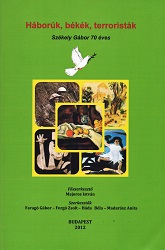
We kindly inform you that, as long as the subject affiliation of our 300.000+ articles is in progress, you might get unsufficient or no results on your third level or second level search. In this case, please broaden your search criteria.

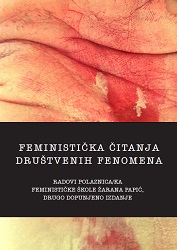
Često zaboravljena i potisnuta par excellence feministička tema, u suštini radnička, je odnos patrijarhata i kapitalizma, odnosno njihova kombinacija koja proizvodi višestruku društvenu nepravdu, čije prve žrtve su žene. Socijalistički feminizam kao razloge ugnjetavanja žena vidi klasnu eksploataciju, a dodaje i opresiju po godinama starosti, stepenu sposobnosti, spolnom identitetu i drugim osnovama.
More...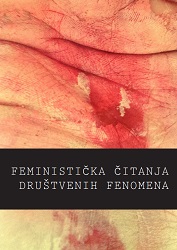
Osjećaj stalne nesigurnosti snažno obilježava cijelu jednu generaciju radnika/ca koja nastaje s kraja 80-ih godina proteklog stoljeća i polako prerasta u novu radničku klasu. Za razliku od generacija iz razdoblja socijalne države, kojima su radnička prava i socijalne ugodnosti osiguravali stalno zaposlenje, penziono i zdravstveno osiguranje, osmosatno radno vrijeme, godišnje odmore, slobodne vikende i sindikalno organiziranje, današnji radnik/ca često može računati na odstustvo svih prava za koje se radnički pokret zdušno borio. Postoje teoretičari/ke koji prekarijat smatraju novom radničkom klasom 21. vijeka, koja je nastala pod uticajem neoliberalnih struja na tržištu rada.
More...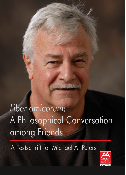
Peter McLaren wrote this piece last and so I come to it last and have recast it as an endword rather than a foreword because I think this will become the basis for an ongoing dialogue of which this exchange is only the first stage. It is so different from the other articles that I decided to engage with it as a postscript or endnote. Peter is a great friend. He is a “mate” as we say in New Zealand and I regard him as a brother and it is with affection that I engage with his ideas here. Where a number of the other contributors attempted to define me in their terms—I am a secret Kantian, universalist or cosmopolitan even if I don’t already know it—Peter seeks to define me by what I’m not and especially by contrast to what he is—a revolutionary Marxist. And he takes up the cudgels on behalf of revolutionary Marxism against postmodernism and poststructuralism which are movements that allegedly define me. This is a tricky assignment for Peter as a revolutionary Marxist because he is on record as being against both postmodernism and poststructuralism and yet at the same time he is my friend and wants to be able to be respectful and to say some nice things. He manages to achieve this very well and with eloquence. I am both flattered and relieved frankly— that we can remain good friends. But I like him and treat him as a brother (even though I have qualms about “brotherhoods”) not because he is a revolutionary Marxist but despite it. He could have been a Mormon.
More...
Oto Fridrih Bolnov se 1938. godine u okviru jednog teksta, vrlo jasno pro-režimskog, (između ostalilh se ponavljaju i citati nekih režimskih ideologa) izričito pozvao na Hajdegera i na njegovu kategoriju povesti da bi osporio apstrakcije »pojma univerzalnosti čoveka« »konkretnog totaliteta« jedne istorijski determinisane zajednice: »Ako pođemo od pomankanja vere u um kao suštine, presudne za čoveka i za podržavanje istorijske svesti, više ne postoji mogućnost da se čovečanstvo posmatra kao svekoliko realno postojeće čiji su delovi pojedinačni narodi, već postoje narodi protiv naroda. Narodi se udružuju u najviši oblik jedinstva, i uspevaju da se slože, dok je čovečanstvo samo univerzalni pojam i ne predstavlja stvarno jedinstvo.«
More...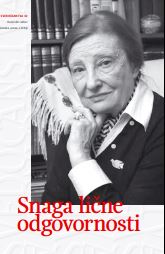
“Liberali i naprednjaci su bili konzervativci.” Navedenim oksimoronom objašnjavana je na časovima istorije delatnost prvih političkih stranaka u Srbiji, nama koji smo stasavali sedamdesetih godina prošlog veka. Kao i brojni slogani koje smo učili napamet i ta jednostavna rečenica je formulisana kako bi nam simplifikovala obimnu istorijsku materiju i olakšala razumevanje vremena u kome su formirane moderne ideologije i nastajali novi kolektivni identiteti. Međutim, sintaksička analiza načina na koji je stavljen znak jednakosti između devetnaestovekovnih liberala i naprednjaka, ukazivala je i na specifičnosti istorijske kulture unutar koje je pomenuti moto osmišljen. Manir prisutan u označavanja “drugog” koji je podrazumevao lakonsko izjednačavanje različitih političkih i ideoloških koncepcija bio je, naime, odraz označitelja mnogo više nego što je predstavljao precizno svedočanstvo o označenom. Sistem koji je brisao razlike među onima koje je prepoznavao kao “druge” i “drugačije”, zapravo je pokazivao nespremnost grupe koja ga je uspostavila da prizna sopstvenu pluralnost.
More...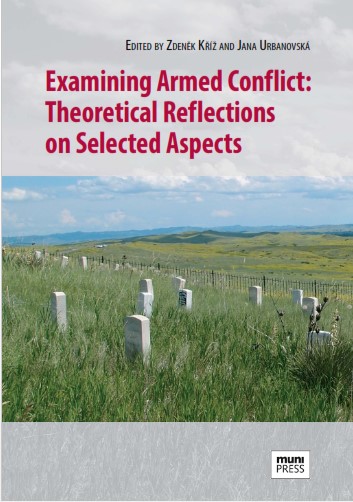
International relations (IR) as an autonomous academic discipline was eventually formed in the interwar era and it set quite an explicit goal– to contribute to the studies of wars and especially to prevent their re-occurrence. Hence the new discipline responded to the existing demandin a society recovering from the horrors of World War I. It had a purely practical task that could hardly be questioned in the social atmosphere of that time. Then as well as nowadays, to fulfill this ambition, it is necessary to pay attention to the study of the causes of wars. Therefore, theories dealing with the studies of the causes of wars are an essential part of the tradition of international relations.
More...
Review of: Andrija Golubović - Pamela Odih, Watersheds in Marxist Ecofeminism. Newcastle upon Tyne, UK: Cambridge Scholars Publishing. 2014. 390 str
More...
This work serves as a reminder and summary of the importance of the social resonance of Israeli artist Shai Zakai’s project Concrete Creek, which with its complexity shows remarkable interpretative possibilities of the project through the queer, spiritualistic and Marxist reading of ecofeminism.
More...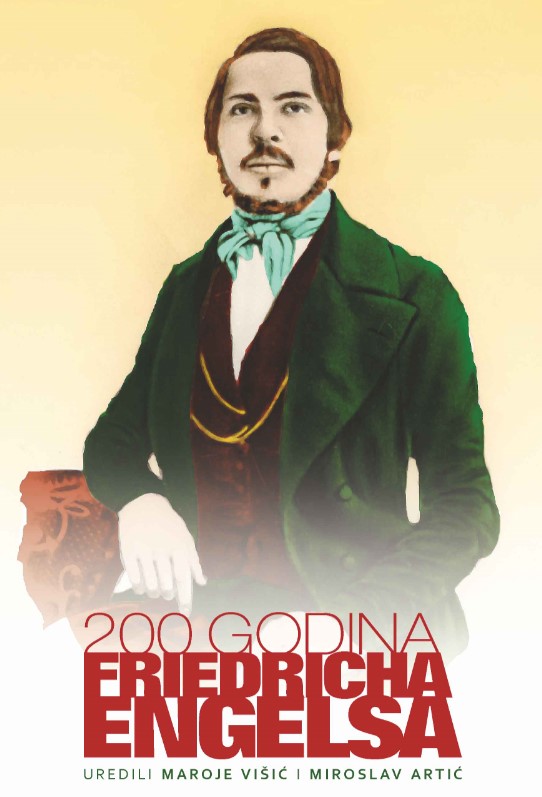
Engels, by a positivistically abbreviated interpretation of the dialectical method, is thought to have contributed to the banalization of Marx’s thought. Engels himself is somewhat to blame for such a view of his role, for he described his relationship to Marx in terms that can very well be interpreted in that light. It is significant that he, who nevertheless gave impetus, in later years avoided dealing independently with the history of economic thought, economic liberalism, and even economic-theoretical issues in general. This is supported by the fact that in “Anti-Dühring”, which I deal with in more detail below, he left the writing of relevant economic-theoretical passages to Marx.
More...
This article gives an overview of the reception of Engels’ philosophy in the “Zagreb School of Practice”. The essential moments of this reception consist in pointing out certain (more or less) differences in the philosophical views of Marx and Engels (authors of Anti–Düring, The Dialectic of Nature and the Writings of Ludwig Feuerbach and the End of Classical German Philosophy). Predrag Vranicki, Gajo Petrović, Milan Kangrga and Lino Veljak in various ways critically analyze the contradictions in Engels’ conceptions, especially regarding the dialectic of nature, and consider Engels’ influence on the formation of orthodox Marxism.
More...
Reflecting on the contemporary society from a Marxist-feminist angle with a focus on the question of women’s oppression, one of the key questions that must be tackled is the structure/nature of the family and marriage. Because of the very significant, if not pivotal, role of the family in capitalism, contemporary conservative currents insist on family more than anything as a nuclear unit of society, where monogamy (of course, only for women) and heteronormativity play major roles. In addition, traditional marriage is the only desirable form of marriage. The position of women in society can be seen from their position in the family, that is, the position of married women. To illustrate this, in this paper we will try, mostly by using Engels’ findings, to explain when and why monogamy and marriage occur and how the family developed. After that we will try to show, based on the work by some socialists and anarchists, and further on Engels, the social basis of the subordination of women in marriage and the family. Finally, through authors like Barret, point out that family is not essentially and naturally given, it is not always the same, on the contrary – it depends on specific social relations. From such historicalmaterialist point of view, marriage and family are revealed as social rather than natural units and as bourgeois ideals.
More...
The expression ’workers’ dilemma” refers to a controversial place in Marx’s and Engels’ Communist Party Manifesto. The authors argue that the final defeat of the proletariat in its struggle against the bourgeoisie will result in »the common ruin”. A similar motif appears in Walter Benjamin’s note known as »The Angel of History”. He understands progress as the result of the intervention of God («the whirlwind from Paradise”). Several intermediary topics are elaborated in the next: from early forms of capitalist exploitation over trade-union confrontation against workers’ democracy to workers’ sadness. The last sections bring empirical insights into the religiosity of workers in Croatia. The first insight is based on quantitative analysis of large samples. The second insight is based on the author’s interviews with two retired workers, examining, among others, their attitudes toward Church and trade unions in Croatia. In place of a conclusion, the author argues that the major advantage of defeats of both the proletariat and the left thought is cognitive, rather than moral-political. There is a big accumulation of knowledge of what was right and what went wrong, respectively, in the workers’ movement and socialism on the whole. Still, there is perhaps some room for theoretical (non-linear development) and practical optimism within the workers’ dilemma. The latter might be noticed in our interlocutors’ optimism in the sense that a more just society is possible, although they could not elaborate on this. The author could not either accrue more grounds for the principled optimism among workers. Instead, he put forward three remarks. One is that the future children cannot be born or survive based on the devastating pessimism of their ancestors. The other remark stays in the line with Marx’ and others’ contentions with utopian socialism, i.e. confined to rare local communities, while the power of the hegemonic capitalism, is overwhelming, capable of destroying any power that is all too small (like the former Yugoslavia which besides was left without international allies). The last remark concerns religious and non-religious worldviews that are mutually compatible only provided that they support peace and, respectively, deny the need to wage wars in the name of God or any other ideological fetish. Essentially, durable peace is unbearable to capitalism and other non-democratic governments, whereby the question of who or what exactly created the world becomes largely irrelevant.
More...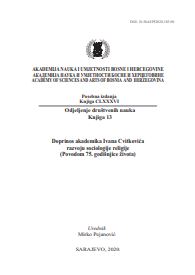
Review of: Ivan Cvitković "Marksistička misao i religija".
More...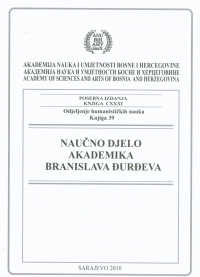
Die marxistische Lehre stellt eine der komplexesten Fragen der modernen Zeit dar, vor allem deswegen, weil nach dem Tod von Karl Marx (1883) eine ganze Reihe von Historikern auftauchten, die sich als seine konsequente Anhänger darstellten. Unter ihnen gab es “verfehlte” oder “falsche Marxisten”, deren Einstellungen völlig von den grundsätzlichen Position des Marxismus abwichen, es gab auch solche, die diese Lehre nur in Ansätzen annahmen, aber auch konsequente Historiker, die in ihre ganze Wissenschaftsphilosophie originäre marxistische Prinzipien einführten. Einer der Protagonisten der letzten Gruppe war auch der bosnisch-herzegowinische Historiker Branislav Đurđev. Seine marxistische Geschichstauffassung brachte er in einer Reihe von Aufsätzen, Studien und Abhandlungen zum Ausdruck, in welchen er explizite seinen Standpunkt verteidigte und jene heftig kritisierte, die von dieser Auffassung abwichen.
More...
Opera lui Franz Kafka a exercitat asupra exegezei marxiste o atracție aproape hipnotică. Fapt straniu, dacă e să lăsăm deoparte psihanaliza literară sau hermeneutica de redacție mistică, niciunde altundeva interesul pentru acest scriitor nu s-a manifestat atât de intens ca în tabăra criticilor marxiști. Mai mult încă decât opera, biografia scriitorului - sau mai precis comerțul intens pe care aceasta s-a presupus că l-ar întreține cu textele propriu-zise - a devenit un argument teribil, în spatele căruia marxismul literar, dar și alte formule critice abuzive au putut să debordeze.
More...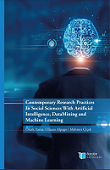
The basic teaching of macroeconomics is based on the principle of managing scarce resources in the most efficient way against endless needs. Liberal economic theories are shaped according to this principle. According to this understanding, countries, societies and individuals who can manage scarce resources in the best way increase their welfare and become prosperous. Societies that fail to achieve this become poorer or fall into the underdeveloped country class.
More...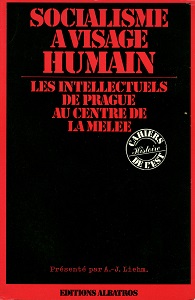
Les débats qui se développent depuis quelques temps chez nous, se concentrent progressivement — et, semble-t-il, logiquement — sur un problème : celui du modèle de démocratie socialiste qui devrait prendre forme chez nous. L.L. y ouvre largement ses colonnes et le résultat de cet intérêt très spécifique aux problèmes politique est particulièrement positif à deux égards.
More...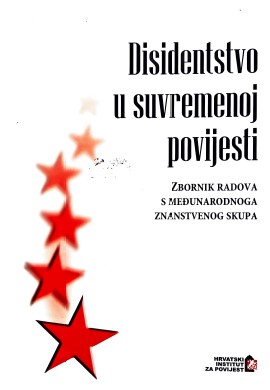
Due to the part it played during the wartime Partisan movement and its prewar Communist experience the town of Vodice became an important stronghold in the district of Šibenik on the road toward the creation of a tradition which was founded on communist ideology, brotherhood and unity, and partisan struggle. In such circumstances a conflict grew between the Catholic Church and the Communist Party in this Dalmatian peasant town following the Second World War. Along the lines of this campaign exemplified by the events of Good Friday 1948, the polarization of its inhabitants is analyzed around two massive gatherings (procession and kolo). The clash of these two gatherings, which served to represent the power and social mobilization of the conflicting forces, took place in the ambiance of the small and narrow kaleta of Vodice and its fields which added to the atmosphere of tension and animosity. Such an atmosphere was channelled in postwar Vodice into a long doctrinal conflict between two institutions and traditions and in some sense symbolically personified not only Vodice’s, but also Croatia’s and indeed a universal experience of their conflict. In this regard, the clash in Vodice coincided with the zenith of their conflict which was expressed in the anti-Church character of the communist regimes in Eastern Europe and in the potential expansion of communism to Italy, the centre of the Catholic Church. As far as the doctrinal differences between Catholicism, or the Church and communist traditions are concerned, they represented a particular segment of the general collision of the Church with “modernism’’. However, unlike other ‘’modernist ideas or ideologies’’, communist tradition was specific and distinct because of its ultra-radical animosity toward the Church and Catholicism, and Christianity in general.
More...
This essay, on the example provided by the Yugoslavian philosophical journal Praxis and a group of sociologists and philosophers gathered around it, points to certain characteristics inherent in the formation of critical thought within communist society. Revisionist Marxism, just like the very system it sought to cleanse from within, contained many contradictions within itself. This text emphasizes a deconstruction of the prevailing relations between the conditions which generally enabled the emergence of critical thought of the ‘praxist’ type on the Yugoslavian social-political scene and its ultimate failure. Deeply entrenched Titoism, a general philosophical orientation as well as an elitism tied to it and a non-transparent relation toward the broader social classes, an anti-national line of criticism, utopian language and Marx as the main and basic starting point – these were all conditions which helped Praxis maintain its position of a relatively independent subject through an entire decade. All these, moreover, were reasons why Praxis’s criticism, however original and humanistic it may have been, was unsuccessful in generating the all-encompassing social transformation for which it called.
More...